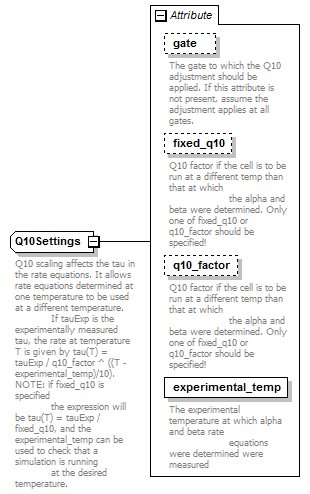<xs:complexType name="Q10Settings">
<xs:annotation>
<xs:documentation>Q10 scaling affects the tau in the rate equations. It allows rate equations determined at one temperature to be used at a different temperature. If tauExp is the experimentally measured tau, the rate at temperature T is given by tau(T) = tauExp / q10_factor ^ ((T - experimental_temp)/10). NOTE: if fixed_q10 is specified the expression will be tau(T) = tauExp / fixed_q10, and the experimental_temp can be used to check that a simulation is running at the desired temperature.</xs:documentation>
</xs:annotation>
<xs:attribute name="gate" type="xs:string" use="optional">
<xs:annotation>
<xs:documentation>The gate to which the Q10 adjustment should be applied. If this attribute is not present, assume the adjustment applies at all gates.</xs:documentation>
</xs:annotation>
</xs:attribute>
<xs:attribute name="fixed_q10" type="xs:double" use="optional">
<xs:annotation>
<xs:documentation>Q10 factor if the cell is to be run at a different temp than that at which the alpha and beta were determined. Only one of fixed_q10 or q10_factor should be specified!</xs:documentation>
</xs:annotation>
</xs:attribute>
<xs:attribute name="q10_factor" type="xs:double" use="optional">
<xs:annotation>
<xs:documentation>Q10 factor if the cell is to be run at a different temp than that at which the alpha and beta were determined. Only one of fixed_q10 or q10_factor should be specified!</xs:documentation>
</xs:annotation>
</xs:attribute>
<xs:attribute name="experimental_temp" type="bio:TemperatureValue" use="required">
<xs:annotation>
<xs:documentation>The experimental temperature at which alpha and beta rate equations were determined were measured</xs:documentation>
</xs:annotation>
</xs:attribute>
</xs:complexType> |
